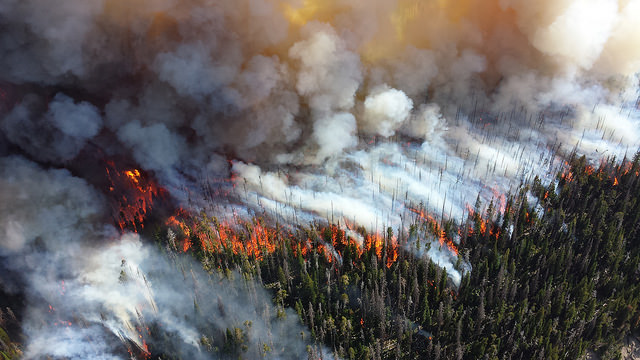The Catastrophic Risks of Climate Change: The US Turns Its Back on the World
My business just picked up. I wish it hadn’t.

My business just picked up. I wish it hadn’t.
I am in the business of finding better ways to prepare for the catastrophic, largely irreversible risks posed by climate change. The risks are so bad that most of us avoid talking about them at the dinner table. They include ocean acidification, “rain bombs” that cause massive flooding, wildfires that burn up our forests and scorch the dirt that sustains them, droughts that reduce our water supplies, heat waves that ramp up “wet bulb temperature” to heights that can kill humans, and the spread of insect-borne diseases that we wish we had never heard of (Chikungunya) and that we thought would never infect us (Dengue).
These were the emerging threats I was working on before President Trump pulled the plug on the Paris Agreement. My work just increased—big time—because without the Paris Agreement, we are moving ever closer toward climate hell.
Climate change is obviously a global problem, but as the second-largest carbon emitter in the world, the U.S. is a disproportionate contributor to it. The international commitments made in Paris gave us at least a fighting chance of keeping the globe under the line experts agree is too dangerous to cross: a 2-degree Celsius increase from pre-industrial levels. With Trump’s withdrawal from the Paris Agreement, the US has not only bowed out as captain but also dropped its baton in the biggest relay race of all time—the race to cut carbon emissions to avoid the very worst impacts of climate change. In doing so, it has also signaled to the rest of rest of the world that they needn’t stay in the race either.
There is no such thing as American exceptionalism when it comes to climate change impacts, and by shredding the U.S. commitment to cut emissions, Trump has left all of the country in harm’s way. Climate change impacts will affect every speck of American soil and virtually every American and many of the consequences will be negative. For example, we will suffer increased respiratory issues and heat-related illnesses. More acres of land will burn; more algae will bloom in our lakes; heat will buckle more roads and train tracks and melt the asphalt; floods will enter more homes, schools, and hospitals; residents along our coasts and rivers will move inland and to higher ground just to escape the waters; and whole coastal communities will start slipping into the ocean. This isn’t the stuff of science fiction. It is happening already, right here in the United States. It just gets worse—a lot worse—the more carbon we send up into the atmosphere.
Just as America suffers, so will the rest of the world. And some of their suffering will spill back onto us. We already have plenty of examples of how climate impacts in other countries threaten global stability and our national security. These include the historic drought in Syria that drove over a million people, mostly young men, to move to cities in search of work and which, in turn, contributed to civil unrest and unprecedented mass migration; the opening of an ocean in the Arctic leading to increased Russian military activity; the rise of insurgent groups like Boko Haram committed to destabilizing governments; increased pressure on U.S. borders from Central American immigrants fleeing agricultural devastation caused by the spread of “coffee rust”; and the threat to U.S. military installations around the world from relentless sea-level rise.
Back in February, Trump sent a warning shot across the bow when he issued his executive order instructing EPA Administrator Pruitt to pull away from Obama’s regulations aimed at curbing emissions from coal-fired power plants. Alarmingly, in that same executive order, President Trump also killed an Obama-era executive order designed to ensure that the U.S. incorporates the impacts of climate change in its national and homeland security policy and planning. With his latest decision to pull America out of the Paris Agreement, Trump has not only ensured that the world will experience even more heat but has also signaled to our national security team that they needn’t prepare for the fallout.
Trump rests his terrifying decisions on the desire to bolster our economy. My response: If he thinks the economy is suffering now, wait until our economy has to struggle against the crushing load of climate change impacts. What happens when flooding routinely breaks supply chains for essential materials, as occurred in Thailand in 2011? What happens to the agriculture sector when it gets too hot for plants to thrive? What happens to the real estate market when 300 U.S. cities lose at least half their homes and 36 U.S cities disappear under rising seas, as Zillow predicts? What happens to commerce when our already crumbling infrastructure is pounded by more heat, flooding, and violent storms? What happens to our urban economies when cities turn into “urban heat islands?” And what happens when all of this happens at once?
President Trump has thrown the world into a vortex of escalating harm ostensibly in the interest of “making America great again.” His action may have provided me new business, but, to the detriment of us all, he has pushed us further toward an irreversible incendiary course.





